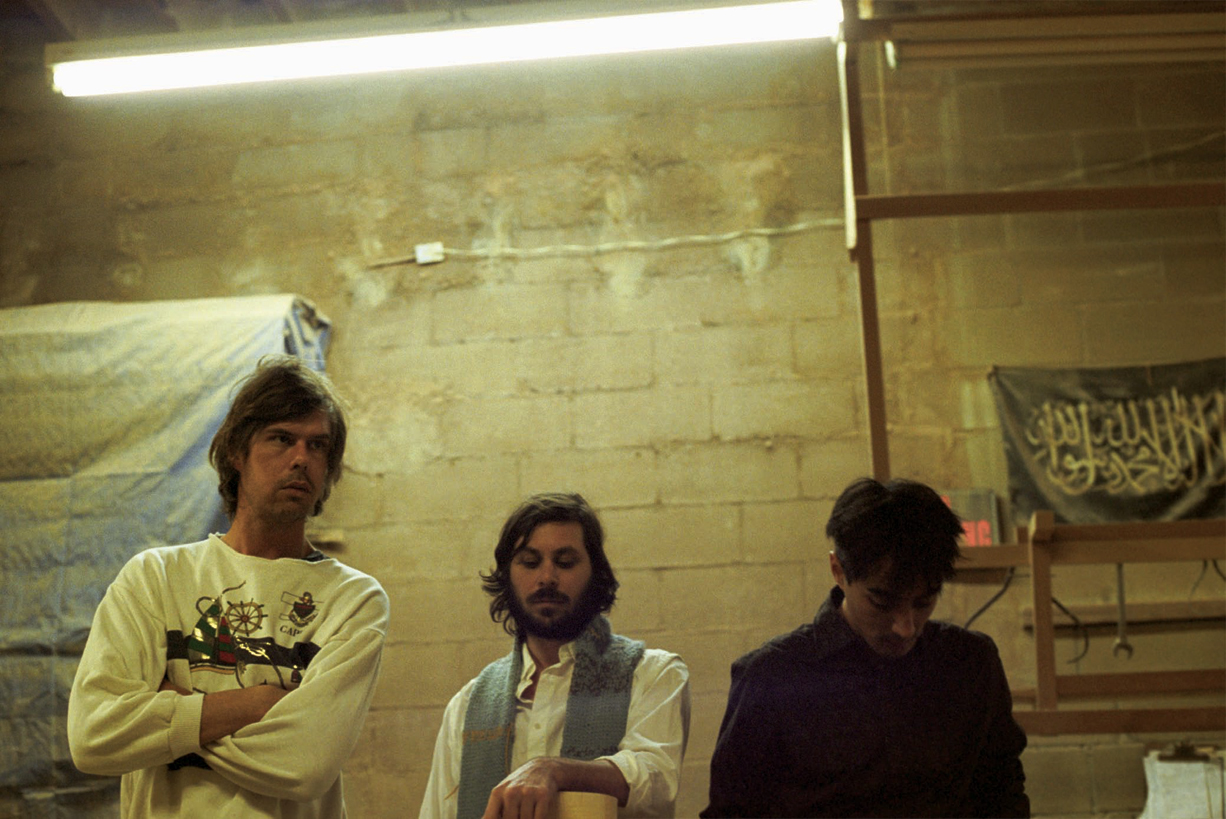Liars “Scissor” from A Bruntel on Vimeo.
In the past decade, there have been few bands more surprising or compelling than Liars. Ruthlessly innovative and committed to constant evolution, its defiant attitude toward the expectations of its audience and the prevailing trends in independent rock has set it apart in a big way. In an era when underground music flirts with the mainstream and bands are often thrust into the harsh spotlight too soon, then discarded before they can fully mature, Liars has blazed its own trail and hasn’t worried about whether or not people would follow. Those who did were not disappointed.
Liars’ 2001 debut, They Threw Us All In a Trench and Stuck a Monument on Top, was an album that was noisy and abrasive but grounded in the dancepunk zeitgeist that dominated turn-of-the-century New York City. Listeners mistook the album for an introduction when, in reality, it was a farewell, a coda to a scene that had already exhausted itself. Bassist Pat Noecker and drummer Ron Albertson, the rhythm section that had an immense presence on those early recordings, soon departed the band, leaving Angus Andrew, Aaron Hemphill, and new member Julian Gross to discover a new sound.
The band’s sophomore effort, the confrontational, conceptually minded They Were Wrong So We Drowned, was a polarizing work. Feeling hampered by the claustrophobic New York scene, Liars escaped to Berlin for a three-year stint and recorded its third release, Drum’s Not Dead, a droning, atmospheric masterpiece that further established its reputation as creative visionaries.
The follow-up, the self-titled Liars, demonstrated that the group’s penchant for thematic concepts had not dulled its ability to write sharp, rousing rock songs. Although that album received a warm reception, frontman Angus Andrew says, “We felt like we lost a sense of adventure.” Without a unifying theme as it had on Drowned and Drum’s, Liars lost some of the joy that it had in developing the earlier records.
“We have to get together and agree on a certain mood,” Andrew says, “to make something that’s more complete than just a bunch of random songs. Part of the fun of making a record is giving it this extra life.”
The band’s fifth and most recent album, Sisterworld (Mute), is a bold burst of intensity, with a loose concept inspired by the band’s recent residency in Los Angeles and its encounters with the city’s darker, unseen elements, ones that challenge postcard narratives of LA as a place of opportunity and optimism.
“When I first moved here,” Andrew says with a wry laugh, “I decided that the best way to get in touch with LA would be to not drive a car.” That’s not an easy proposition in a city known for its pedestrian unfriendliness. Andrew was living in La Brea, home to the famous La Brea Tar Pits, one of what he calls LA’s overlooked sections.
“The city is so huge, and people spend their time in cars, going from A to B and never taking into account the places they’re passing in between,” he says. “This was one of those places — a constant barrage of crime and homeless people. The non-recognition of that by the people driving through can be really frustrating.”
Despite its frustrations, relocating to Los Angeles had its benefits as well. “I really wanted to get isolated and shut off from a lot of things,” Andrew says of his time in Germany, “and it was great for that. But in terms of getting things done, it was much more difficult getting a group of musicians together to play on the record.
“Coming to LA was like coming back to our parents’ house. Julian and Aaron are both from here; there’s a huge network of friends and family for us. The environment in Berlin, where it’s cold and where we didn’t speak the language, it was kind of freaky, in a good way, but it’s amazing to realize what an uphill battle that was.”
This extra support enabled Liars to introduce sounds and ideas onto Sisterworld that it hadn’t felt it could properly execute with its previously limited resources. The difference can be heard on the album’s opening track, “Scissor,” which features some delicate, mournful strings as an emotive counterpoint to Andrew’s signature falsetto.
It’s but a prelude to the searing rush of noise that Hemphill and Gross are waiting to release in a torrent, mercilessly scouring any evidence of tenderness from the song.
The thematic core of Sisterworld is elusive, conveyed more in implication and feeling than in any overt way. “What drove us to this idea was being here in a city like Los Angeles,” Andrew says, “which gives off this image of Hollywood glamor or perfection when the genuine story of LA is people coming here to get into the movie business and 90 percent of them being rejected. LA is this large pool of rejection. But it maintains this glittering outward appearance.”
Those who don’t succeed in Hollywood often fade into the shadows, seeking out some obscure niche in which they can ensconce themselves. Sisterworld plumbs those depths, shedding light on an underworld of a superficial city and the people who inhabit it.
“They find places,” Andrew says. One of those places happened to be adjacent to his downtown dwelling. “There was this place next to me, an after-hours club where these underground characters would come late at night to party, and I found myself witness to these people who came to LA but didn’t necessarily fit in. They found their own environments. Sisterworld is us creating our own space, where you can define on your own terms and feel as if you can be the one who determines the laws and the way things are run. It’s somewhere you can escape to.”

